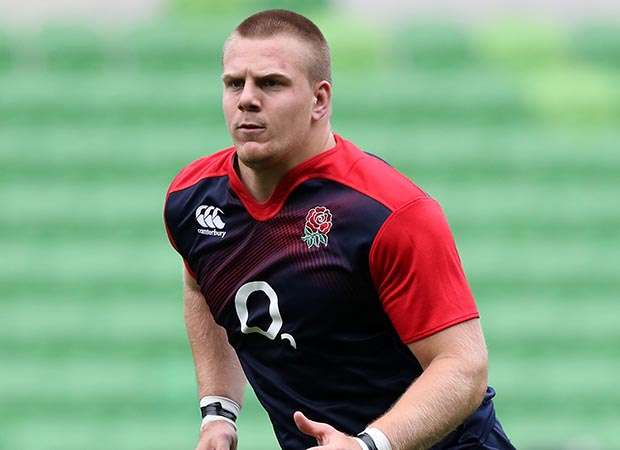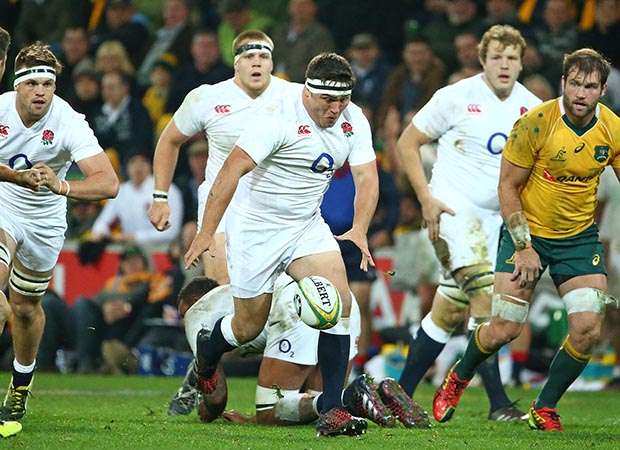 Paul Hill is a 21-year-old who has relished being stuck between a rock and a hard place during England's victorious tour Down Under. That's because, despite his tender years, Hill is England's tight-head in waiting – the strongman who must keep the scrum solid despite having to repel not one front row adversary, but two.
Paul Hill is a 21-year-old who has relished being stuck between a rock and a hard place during England's victorious tour Down Under. That's because, despite his tender years, Hill is England's tight-head in waiting – the strongman who must keep the scrum solid despite having to repel not one front row adversary, but two.
Not only does the man wearing the No.3 jersey have to handle the combined assault of the opposition loose-head and hooker, but the main force of the opposition scrum being channelled through them.
It is not a job for anyone who does not have a back and neck like a steel-girder, and legs that could support an oil rig. At 18st 6lb (117kg) and 6ft 2in (1.88m), Hill has proved he has the physical prerequisites to handle the tonnage, as well as the mental edge, by bringing impressive last quarter bench impact to the first and second Test victories over the Wallabies.
As well as putting pressure on the reinvigorated Dan Cole, Hill has supplanted his Northampton Saints tight-head rival, Kieran Brookes, in the England pecking order. One of the aspects of Hill's game that has the front-row purists signalling their approval is the straight, flat shape of his back on engagement, which becomes marginally convex as the weight comes on and the power is transmitted.
The other area where the Saints youngster scores highly is his mobility and work-rate in the loose for a tight-five forward. Hill played in the same England U20 world junior championship-winning side as Maro Itoje in 2014, and he shows the same signs of not having left his skills hanging on a peg at the last set-piece.
Like Itoje, he puts himself about, and whether it's tackling, handling or competing at breakdowns, he brings match-turning added value in the loose. One of the episodes that first alerted Eddie Jones to Hill's potential came early in the new year when he burst through to touch down for Saints against Leicester from 50 metres out, and was unfortunate when his spectacular charge was ruled out because of a high tackle by a team-mate.
That assurance on the ball wasevident when he was part of thehandling sequence that set-up Jack Nowell's late try in the 39-28 win in Brisbane, and he was also part of the small posse chasing Jamie George's inspired grubber before Owen Farrell claimed the series-sealing last try in Melbourne.
The enthusiasm with which Hill remembers those moments is contagious. His recall of his part in the Nowell try is light-heartedly vague: “I'd hardly count it, but if you want to say that … I passed the ball. That was it, wasn't it? I passed it, that's as much as I remember. No, actually I've remembered – I made a 50-metre break!”
What about George's chip? “Champagne time! It was an awesome bit of skill from him. When people say you come on as a front row, you need to carry on what people have laid before you. That's really important. It's about the people setting the standards, and you hope that when you are called to come on you add something to what's there.”
What stood out in all three Tests was that England did just that. They had a far stronger boost off the bench when it mattered than Australia. So, what does Hill make of the two 15-minute cameos that brought him his third and fourth caps – the first having come against Italy in the second round of England's Grand Slam campaign – not to mention yesterday's clinching performance.
 “I've really enjoyed every time I've got on so far…I'm relishing my time on the pitch. I thought we did well when we came on as the front three (in Melbourne, with Matt Mullan and Jamie George above). I just get on with the job when I'm on the pitch. You try not to worry about the bigger picture, when you're on the field you just get on and do your job.”
“I've really enjoyed every time I've got on so far…I'm relishing my time on the pitch. I thought we did well when we came on as the front three (in Melbourne, with Matt Mullan and Jamie George above). I just get on with the job when I'm on the pitch. You try not to worry about the bigger picture, when you're on the field you just get on and do your job.”
Hill's response reflects the way that Jones appears to have got the best out of his players by keeping the message simple, and not overloading them. So, while Hill's bench segments against Australia three times (42 minutes), Wales in May (12 minutes) and Italy (11 minutes) amount to only 78 minutes of international experience, he argues that they are worth a whole lot more.
“It's important. People say the tight-head position is a massive part of the scrum, and it is because it's two people against one at a scrummage – and if you lose penalties it becomes detrimental to the team. It's as easy as that. The last thing we want to do is concede loads of penalties, and that's why it's so important to have a tight-head that can scrummage well.”
Hill elaborates: “I'm happy with how I've done so far, but there is always room for improvement. In these big Test games it's important to always have your eye on the ball and look for small margins of improvements. In Test rugby the margins are tiny. So, it can be something in the scrum like foot placement, or how you want to bind that week. It can be as simple as that. It's about learning, getting a bank of knowledge so you can use that – it's about how the opposition react to you, and how you react to them.
He adds: “Also, your body builds towards how you want to scrummage as an individual. Obviously, you have a set plan of what you want to do. But you have to realise where the opposition are stronger, and how you can sometimes get around that.”
Hill says he is also beginning to understand the specialist art of making an impact as a replacement.
“You're watching the game constantly and trying to pick up small things going on in the scrum. You try to analyse when you're on the bench…it's not like you're going on completely cold, you do your appropriate physical warm-up and then you're picking up small things so when you get on you use that time on the bench.”
It is not the only area in which Hill has had to make a rapid transition. The received wisdom about front row forwards is that they develop the ‘man-strength' to cope with the physical demands of propping at international level only when they are in their late 20s to mid 30s.
 Young guns like Hill are challenging that perception. He says that the season he spent in the Championship with Leeds Carnegie before joining Northampton last summer played an essential part in developing the strength to cope with what the Wallabies have thrown his way.
Young guns like Hill are challenging that perception. He says that the season he spent in the Championship with Leeds Carnegie before joining Northampton last summer played an essential part in developing the strength to cope with what the Wallabies have thrown his way.
“That (man-strength) was most relevant when I stepped up from age group stuff to when I was in the Championship, though obviously it steps up again when it comes to the Premiership – but you have to learn fast, especially when you're trying to climb the ranks. When I started out I was in National League 2 North with Otley, and then I came up to Championship with Leeds and now the Premiership with Northampton. Now I'm playing in Test match rugby.”
Hill says his rivalry with Brookes at Saints has helped him. “It's important to have competition wherever you go because, like Dylan Hartley says, if two people are pushing for a position it really helps to cast us out of complacency. We push each other pretty hard.”
There is a Yorkshire thread to Hill's background, along with a German connection. His father is English, his mother German, and he was born in Aschaffenburg, Bavaria, before moving to Yorkshire, where he played his junior rugby at Doncaster Knights from the age of seven before being signed by the Leeds Academy from Prince Henry's Grammar School, Otley.
Hill says self-deprecatingly that while tight-head props may be rugby union's new MVPs, his route to it was well-worn. “When I was a kid I was the slowest on the park, so they put me at tight-head.”
He made such an impact that he went on to play 19 times for England U20s, before graduating to full international honours after only nine Premiership appearances for Northampton, picked first as an unused replacement by Jones in the opening game of the 2016 Six Nations against Scotland.
Hill lists cooking, English literature and chess among his favourite pastimes – and names 2003 World Cup winner Phil Vickery, who also won Masterchef, as one of his role models.
“Phil Vickery was definitely in there, for what he did around the park as well. When you are young I don't think you really appreciate the scrum – everyone loves the 10s and all the fancy stuff, but nobody really appreciates props. Even if you play tight-head you're like, ‘oh I wish I could be a little bit faster'. You never really appreciate their work until you get older. Then you think, fair play, they're doing a really good job.”
Does he fancy a crack at the cookery show? “If someone said, ‘hey, do you want to go on Masterchef', I'd give it a go. You put me in that competitive situation, I would take it on. I make a good crème brulee.
“At Christmas we always have crème brulee for pudding because I used to make it when I was younger and I'm quite good…it started because I wanted to play with a Bunsen burner!”
Hill says that his father has always counselled him against putting all his eggs in the rugby basket, and he has taken the advice by studying for an English degree at Leeds Beckett University. He says outside pro rugby, his second choice would be to teach it.
“There was no guarantee to play for England, so he always said you need something to fall back on if it goes pear shaped,” he said. “That's why I tried uni. I enjoy learning as well. I like Shakespeare – comedies like Taming Of The Shrew – and I like early 20th century American writers, such as F Scott Fitzgerald. Sometimes it's a bit tough when you have to read loads on top of your studies, but life's hard, just get on with it.”
So far, Paul Hill has not just done that very effectively, he's also put down a marker in one of the toughest trades in the game.


























